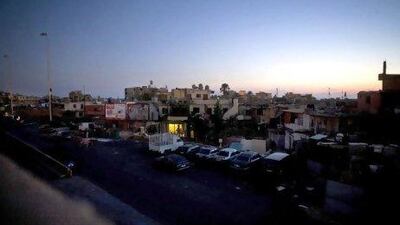BEIRUT // For the Buwari household in the town of Baalbek, working their way around hours of power cuts is part of their daily routine.
The family of seven cope with just nine hours of electricity a day. The rest of the time they switch between generators as the need arises, said Ali Buwari, 23, who lives at home with his parents and four siblings.
"Of course in Lebanon you can't live without a generator, this is normal," he said. "For us it's difficult, but we are not very rich, and not that poor. For poor people it is very difficult."
Proponents of a US$1.2 billion (Dh4.4 billion) emergency energy bill passed by Lebanon's cabinet on Wednesday believe their plan will set a path towards tackling the spiralling power crisis that affects households like the Buwaris' across the country.
The controversial plan includes an emergency solution to generate an additional 700 megawatts of electricity through the rehabilitation and upgrade of ageing power plants, raising the output to 2,200 megawatts.
Cesar Abou Khalil, an adviser to the energy minister, Gebran Bassil, said: "How is the Lebanese citizen aware of the problem? It's because of the outages, he doesn't get electricity 24/7.
"This is because we have a deficit in power generation of 1,100 megawatts. Next year it will be 1,250 megawatts because of the increased demand."
Cabinet members reached a compromise on Wednesday after divisions threatened the country's government, which was only formed in June.
Michel Aoun, who heads the largest single bloc in the 30-member cabinet, had threatened to withdraw his 10 ministers if development projects such as the electricity plan were not approved.
There had also been warnings that Mr Aoun's Free Patriotic Movement (FPM), of which Mr Bassil is a member, would boycott cabinet meetings if a compromise was not reached, potentially paralysing the government.
The divisions in approving the plan centred on funding for the project, who would supervise the spending and whether there was sufficient government oversight.
Ministers agreed to fund the proposal in four installments, as opposed to one single payment. Plans to establish a committee to oversee the project were also discussed, local media reported.
The bill will now be voted on in parliament, where it needs an absolute majority to be passed.
"Lebanon won today," the prime minister, Nejib Miqati, said on Wednesday, the Daily Star newspaper reported. "Any dispute or discussion is to reach one goal: to provide electricity to the people."
Opposition has come from the rival March 14 coalition which has strongly criticised the plan for not being transparent enough. The FPM had accused the Future Movement, led by the former prime minister Saad Hariri, of trying to thwart efforts to pass the bill.
Yesterday, the Future Movement MP Mohammed Qabbani said the party would "closely monitor" the project.
"Our team will deal objectively with this issue because it was the first to demand electricity for citizens," he said, according to the state-run National News Agency.
The current bill is just part of a long-term $5 billion plan to provide 24-hour electricity. What is not in question is that the country's decades old power-generation infrastructure is in dire need of an overhaul.
As demand for energy increases and the energy output decreases, the Lebanese public spends upwards of $1.7 billion a year on generators, according to Mr Abou Khalil. In parts of the Lebanese capital, residents cope with rolling power outages of three hours a day on average. In more remote areas, such as Baalbek, 10-hour blackouts are not uncommon.
Mr Bassil, who is also Mr Aoun's son-in-law, had previously warned that if the government did not move to improve the power generation system, the country could face daily 15-hour electricity cuts by 2015.

